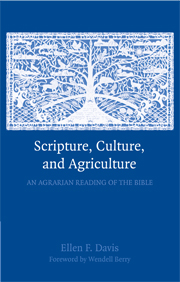Book contents
- Frontmatter
- Contents
- Foreword by Wendell Berry
- Acknowledgments
- Abbreviations
- Introduction
- 1 Rupture and Re-membering
- 2 Reading the Bible Through Agrarian Eyes
- 3 Seeing with God: Israel's Poem of Creation
- 4 Leaving Egypt Behind: Embracing the Wilderness Economy
- 5 A Wholesome Materiality: Reading Leviticus
- 6 Covenantal Economics: The Biblical Case for a Local Economy
- 7 Running on Poetry: The Agrarian Prophets
- 8 Wisdom or Sloth? The Character of Work
- 9 The Faithful City
- Postscript
- Notes
- Scripture Index
- Index
6 - Covenantal Economics: The Biblical Case for a Local Economy
Published online by Cambridge University Press: 05 June 2012
- Frontmatter
- Contents
- Foreword by Wendell Berry
- Acknowledgments
- Abbreviations
- Introduction
- 1 Rupture and Re-membering
- 2 Reading the Bible Through Agrarian Eyes
- 3 Seeing with God: Israel's Poem of Creation
- 4 Leaving Egypt Behind: Embracing the Wilderness Economy
- 5 A Wholesome Materiality: Reading Leviticus
- 6 Covenantal Economics: The Biblical Case for a Local Economy
- 7 Running on Poetry: The Agrarian Prophets
- 8 Wisdom or Sloth? The Character of Work
- 9 The Faithful City
- Postscript
- Notes
- Scripture Index
- Index
Summary
Piety is deepest practicality, for it properly relates use and enjoyment. And a world sacramentally received in joy is a world sanely used. There is an economics of use only; it moves toward the destruction of both use and joy. And there is an economics of joy; it moves toward the intelligence of use and the enhancement of joy.
(Joseph Sittler)The stability, coherence, and longevity of human occupation require that the land should be divided among many owners and users. The central figure of agrarian thought has invariably been the small owner or small holder who maintains a significant measure of economic self-determination on a small acreage. The scale and independence of such holdings imply two things that agrarians see as desirable: intimate care in the use of the land, and political democracy resting upon the indispensable foundation of economic democracy.
(Wendell Berry)THE VALUE OF A LOCAL ECONOMY
Agrarians in every culture must reckon with the issue of land possession, usually as a vexed issue. The fact that land possession is a central (arguably the central) issue of the Hebrew Scriptures thus confirms their fundamentally agrarian character. And of course the issue remains vexed; the intensity of the conflict over possession of the land once called Canaan is probably greater today than it was in the Iron Age, and certainly more people and religious perspectives are involved.
- Type
- Chapter
- Information
- Scripture, Culture, and AgricultureAn Agrarian Reading of the Bible, pp. 101 - 119Publisher: Cambridge University PressPrint publication year: 2008



